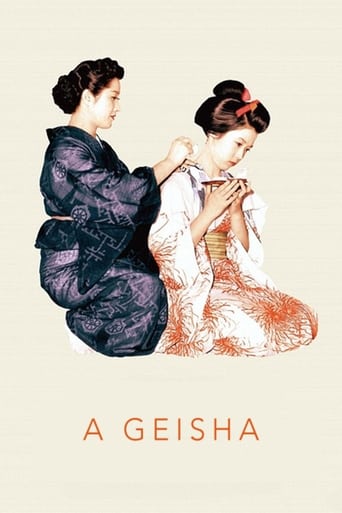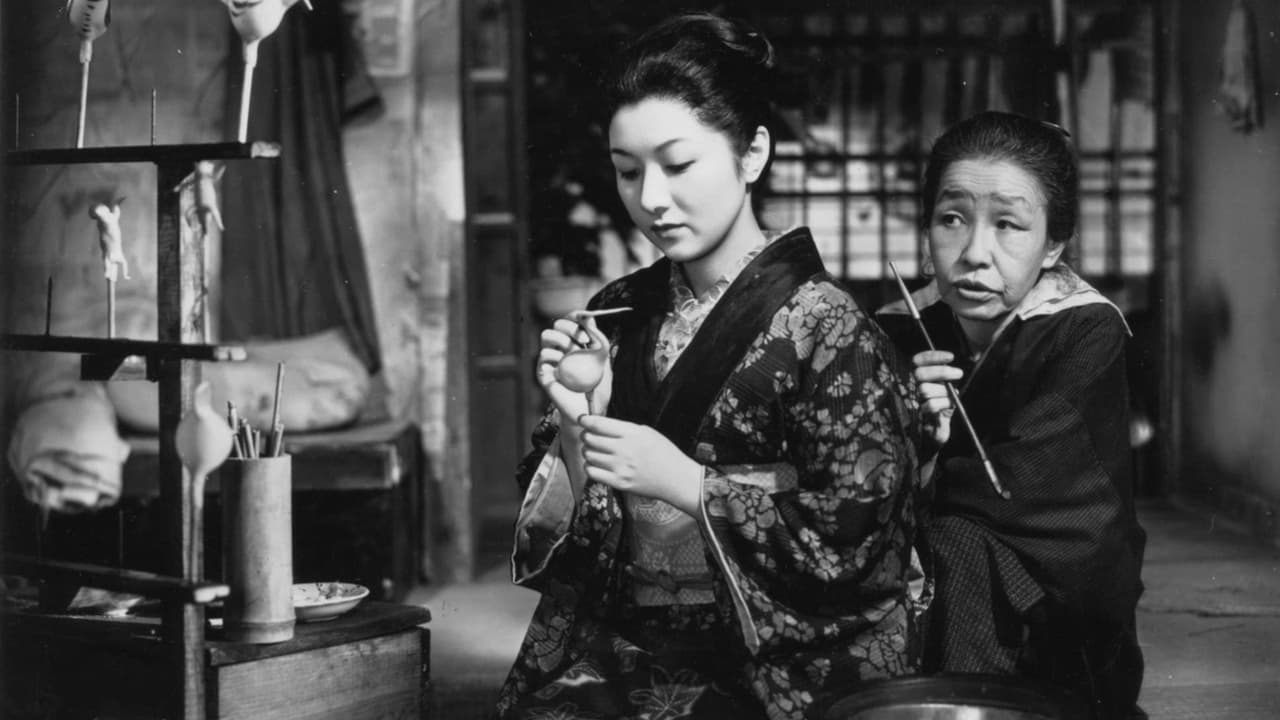lreynaert
This movie by Kenji Mizoguchi treats one of his favorite themes: the living conditions of the geishas, here in modern Japan.The main character in this movie is a maiko (a young apprentice geisha), sponsored by an older 'sister'. After becoming herself a geisha, the maiko doesn't accept the former rules of the game anymore. She doesn't want to sell her body to anyone or everywhere. On the other hand, the madam of the geisha house doesn't like to lose important customers. At the same time, her 'older sister' becomes an important pawn in a corruption case. A customer of a company refuses to sign a major contract, a matter of life or death for the company, if he doesn't get the geisha's favors and become her 'protector'. She has to choose between her material and her emotional (sexual) interests.This intimate film is a critical analysis of the status of women in a Japanese society dominated by males, who believe that everything is permitted, especially with women who are bound by debts to their houses and their bosses. Kenji Mizoguchi directed this movie impeccably. Highly recommended.
Claudio Carvalho
In the post-war, the sixteen year-old teenager Eiko (Ayako Wakao) seeks out the geisha Miyoharu (Michiyo Kogure) in the district of Gion, in Kyoto asking her to be a "maiko" (apprentice of geisha). Eiko explains that her mother, who was a geisha and Miyoharu's friend, has just passed away; her father Sawamoto (Eitarô Shindô) has failed in business; and her uncle is harassing her. Miyoharu is a warm-hearted woman and accepts to train her. One year later, Eiko's father refuses to be her guarantor and Miyoharu borrows a large amount from the tea-house owner Okimi (Chieko Naniwa) to buy her kimono and debut in a party. Miyoharu changes Eiko's name to Miyoe and introduces the teenager to clients as her sister. Soon Miyoharu is charged for the money but neither she nor Miyoe wants to have patrons. "Gion bayashi", a.k.a. "A Geisha", shows the life of geisha in the early 50's as exploited women without other alternative in life but pleasing clients, no matter how abusive they can be. The cruel system imposes an initial debt of a large amount to someone in order that the woman becomes slave of the "tea-house owner', or a businessman that may become his "patron" and is almost impossible to leave the prostitution. Both lead characters are strong women bowed by the system. My vote is seven.Title (Brazil): Not Available.
heliotropetwo
There may be an element of atonement in Mizoguchi's films about exploited women. It is most powerful in "Street of Shame" but plays a role in "Gion bayashi" as well. The exploiters are bad indeed, though Mizoguchi gives them humanizing motivations; the exploited, while not too good to be true, are much better than most of the people I know.What makes this visually beautiful film unforgettable and worthy of repeated viewing is, first, the evolving relationship between Older and Younger Sister, which is sufficiently imitative of life to satisfy the most rigorous champion of Kurosawa's "Lower Depths." As life happens, these two women evolve. It is this evolution which is the secret heart of "Gion Festival Music." Second, importantly, it is the nuanced, understated, but heroic performance of Michiyo Kogure as Miyoharu. Her artistry becomes manifest when her character portrait here is compared to her equally successful role of Taeko in Ozu's "Flavor of Green Tea over Rice," made the year before. The two women could not be more different, and she accomplishes the differences with bare flickers of change across her face and almost imperceptible alterations in body language.These qualities inspire me to forgive the overly schematic plot and excessively contrasting portraits of the very good and the very bad.At the end "Gion Festival Music," "A Geisha," or whatever title translation one wishes to use, is not principally about the cruel exploitation of women. The film has a secret. It is a love story. And I love this movie.
MartinHafer
This is the story of a woman who becomes a Geisha. She is never given any choice and she becomes a virtual slave to the system. In essence, its as if the was sold to the owner of the stable of Geishas. Then, after all her training and money spent making her the perfect host and performer, her "owner" expects the girl to pay her back by sleeping with her clients--whether or not she finds them repellent or not. The girl objects and is abused and threatened until she complies. A TOUGH movie to watch, indeed.This movie is diametrically opposed to the documentaries I have seen about the lives of Geishas. They portray the women as entertainers and say they do NOT sleep with the clients--unless, of course, one agrees to do this on her own. This may be true now, but I know that this was not always the case--particularly with women the Japanese kidnapped from Korea and other parts to be "comfort women"--less "Geishas" with all their training but more glorified prostitutes.A very unusual and interesting film that will also tug at your heartstrings for this poor girl.


 AD
AD



